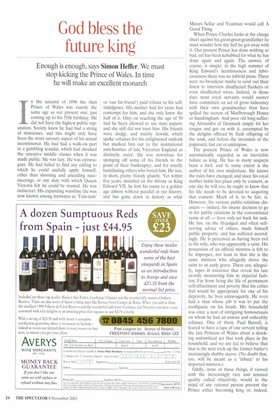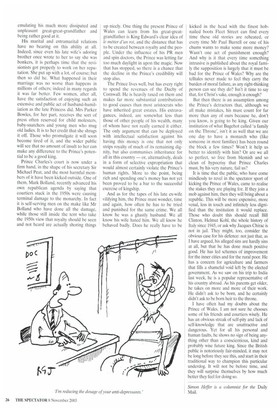God bless the future king
Enough is enough, says Simon Heifer. We must stop kicking the Prince of Wales. In time he will make an excellent monarch
In the autumn of 1896 the then Prince of Wales was exactly the same age as our present one: just coming up to his 55th birthday. He did not have the highest public reputation. Society knew he had had a string of mistresses, and this might only have been the more savoury aspect of his sexual incontinence. He had had a walk-on part in a gambling scandal, which had shocked the retentive middle classes when it was made public. He was lazy. He was extravagant. He had failed to find any calling to which he could usefully apply himself. other than shooting and attending racemeetings, or any duty with which Queen Victoria felt he could be trusted. He was indiscreet. His expanding waistline (he was now known among intimates as 'Turn-turn.
or 'our fat friend') paid tribute to his selfindulgence. His mother had for years had contempt for him, and she only knew the half of it. Only on reaching the age of 50 had he been allowed to see state papers: and she still did not trust him. His friends were dodgy, and mainly Jewish, which spoke volumes for his enlightened outlook but marked him out to the institutional anti-Semites of late Victorian England as distinctly outré. He was notorious for sponging off some of his friends to the point of their bankruptcy, and for cruelly humiliating others who bored him. He was, in short, pretty bloody ghastly. Yet within five years, installed on the throne as King Edward VII, he lent his name to a golden age almost without parallel in our history, and has gone down in history as what Messrs Sellar and Yeatman would call A Good Thing.
When Prince Charles looks at the charge sheet against his great-great-grandfather he must wonder how the hell he got away with it. Our present Prince has done nothing so bad, yet has been kebabbed for what he has done again and again. The answer, of course, is simple: in the high summer of King Edward's licentiousness and lubriciousness there was no tabloid press. There were no broadcast media to send out their finest to interview disaffected flunkeys or even disaffected wives. Indeed, in those days most royal servants would sooner have committed an act of gross indecency with their own grandmother than have spilled the secrets of Marlborough House or Sandringham. And poor old long-suffering Alexandra of Denmark simply bit her tongue and got on with it, untempted by the delights offered by flash offspring of the souk, and before the invention of the paparazzi, fast car or underpass.
The present Prince of Wales is now automatically regarded as an inevitable failure as king. He has in many respects been a fool, and to some extent is the author of his own misfortune. He knows the rules have changed; and since his royal mother holds her place only by consent, as one day he will too, he ought to know that his life needs to be devoted to acquiring that consent. Much of it, to be fair, is. However, his various public-relations disasters — indeed, his insane decision to go in for public relations in the conventional sense at all — have only set back his task. He has, on the ill-judged and often selfserving advice of others, made himself public property, and has suffered accordingly. He is perceived as having been evil to his wife, who was apparently a saint. His possession of an official mistress is felt to be improper, not least in that she is the same mistress who allegedly drove the saint to an early grave. There are, allegedly, tapes in existence that reveal his late ex-wife monstering him in imperial fashion. Far from living the life of permanent self-effacement and poverty that his critics feel would be appropriate for one of his depravity, he lives extravagantly. He even had a man whose job it was to put the toothpaste on his brush. His household was once a nest of intriguing homosexuals on whom he had an unwise and unhealthy reliance. One of them, Paul Burrell, is feared to have a tape of one servant telling the late Princess of Wales about a shocking sodomitical act that took place in the household, and we are led to believe that that is the next trick up the former butler's increasingly shabby sleeve. (No doubt that, too, will be meant as a 'tribute' to his departed mistress.) Oddly, none of these things, if viewed with the increasingly rare and unusual quality called objectivity, would in the mind of any rational person prevent the Prince either becoming king or, indeed, emulating his much more dissipated and unpleasant great-great-grandfather and being rather good at it.
His marital and extramarital relations have no bearing on this ability at all. Indeed, since even his late wife's adoring brother once wrote to her to say she was bonkers, it is perhaps time that the revisionists got properly to work on her reputation. She put up with a lot, of course; but then so did he. What happened in their marriage was no worse than happens in millions of others; indeed in many regards it was far better. Few women, after all, have the satisfaction of enjoying such an extensive and public act of husband-humiliation as the late Princess did. Mrs Parker Bowles, for her part, receives the sort of press often reserved for child molesters, baby-snatchers and young men who mug old ladies. It is to her credit that she shrugs it off. Those who promulgate it will soon become tired of it, and the wider public will see that no amount of insult to her can make any difference to the Prince's potential to be a good king.
Prince Charles's court is now under a firm hand, in the shape of his secretary Sir Michael Peat, and the most harmful members of it have been kicked outside. One of them, Mark Bolland, recently advanced his own republican agenda by saying that courtiers stuck in the 1950s were causing terminal damage to the monarchy. In fact it is self-serving men on the make like Mr Bolland who have done all the damage, while those still inside the tent who take the 1950s view that royalty should be seen and not heard are actually shoring things
up nicely. One thing the present Prince of Wales can learn from his great-greatgrandfather is King Edward's clear idea of le metier dun roi, and the distance that has to be created between royalty and the people. Under the influence of his PR men and spin doctors, the Prince was letting far too much daylight in upon the magic. Now that has stopped, so there is a chance that the decline in the Prince's credibility will stop also.
The Prince lives well, but has every right to spend the revenues of the Duchy of Cornwall. He is heavily taxed on them and makes far more substantial contributions to good causes than most aristocrats who have inherited great estates. His extravagances, indeed, are somewhat less than those of other people of his wealth, many of whom have not really earned it either. The only argument that can be deployed with intellectual satisfaction against his having this money is one that not only strips royalty of much of its remaining dignity, but also communises inheritance for all in this country — or, alternatively, deals in a form of selective expropriation that would almost certainly violate the Prince's human rights. More to the point, being rich and spending one's money has not yet been proved to be a bar to the successful exercise of kingship.
And as for the tapes of his late ex-wife vilifying him, the Prince must wonder, time and again, how often he has to be tried and punished for the same crime. We all know he was a ghastly husband. We all know his wife hated him. We all know he behaved badly. Does he really have to be kicked in the head with the finest hobnailed boots Fleet Street can find every time these old stories are reheated, or every time Mr Paul Burrell or one of his chums wants to make some more money? Wasn't one act of punishment enough? And why is it that every time something intrusive is published about the royal family the supposition is largely that it must be bad for the Prince of Wales? Why are the telltales never made to feel they carry the burden of moral failure, as any right-thinking person can see they do? Isn't it time to say that, for Christ's sake, enough is enough?
But then there is an assumption among the Prince's detractors that, although we all make mistakes, his must count for far more than any of ours because he, don't you know, is going to be king. Given our institution of what Bagehot called 'a family on the Throne', isn't it as well that we are one day to have a monarch who (like someone in most families) has been round the block a few times? Won't it help us better to identify with him? Or are we all so perfect, so free from blemish and so clean of hypocrisy that Prince Charles must, by his very nature, fail us?
It is time that the public, who have come mindlessly to revel in the spectator sport of kicking the Prince of Wales, came to realise the stakes they are playing for. If they join a mob against him, then they will bring about a republic. This will be more expensive, more venal, less in touch and infinitely less dignified than the institution it would replace. Those who doubt this should recall Bill Clinton, Helmut Kohl, the whole history of Italy since 1945, or ask why Jacques Chirac is not in jail. They might, too, consider the obvious case for his defence: not just that, as I have argued, his alleged sins are hardly sins at all, but that he has done much positive good. He has led schemes of improvement for the inner cities and for the rural poor. He has a concern for agriculture and farmers that fills a shameful void left by the elected government. As we saw on his trip to India last week, he is a popular representative of his country abroad. As his parents get older, he takes on more and more of their work. He didn't ask to be born, and he certainly didn't ask to be born heir to the throne.
I have often had my doubts about the Prince of Wales. I am not sure he chooses some of his friends and courtiers wisely. He has an obvious streak of self-pity and lack of self-knowledge that are unattractive and dangerous. Yet for all his personal and human faults, he shows no sign of being anything other than a conscientious, kind and probably wise future king. Since the British public is notoriously fair-minded, it may not be long before they see this, and start in their traditional way to champion this particular underdog. It will not be before time, and they will surprise themselves by how much better they feel for doing so.
Simon Heifer is a columnist for the Daily Mail.



































































































 Previous page
Previous page